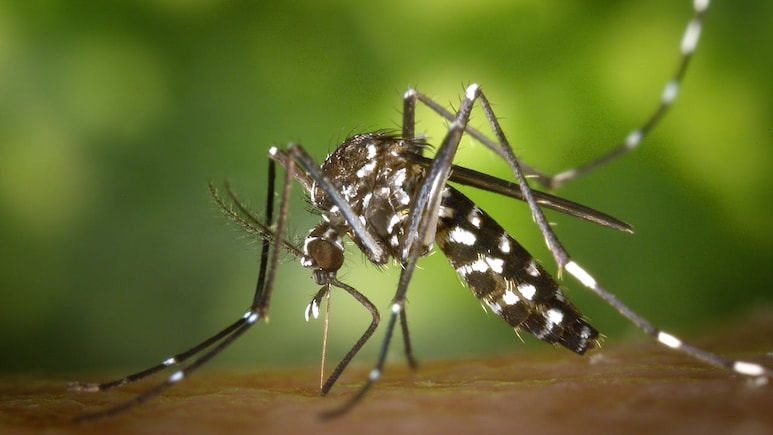
The authorities in the Delhi-NCR region have issued a high alert following a sharp rise in dengue cases across the city. Hospitals especially in Noida and Ghaziabad are witnessing an influx of patients with fever and body aches as mosquito breeding intensifies even after monsoon has come to an end in North India. In fact, even as cases continue to rise, reports suggest that fatalities due to dengue are also continuing to occur. To understand the situation further and take the necessary precautions, it's crucial to know the reasons behind why the dengue cases are surging in the region with over 2,000 cases recorded as of today.
Why Is Dengue Surging in Delhi-NCR?
As for the possible reasons behind this alarming surge, the district health officials explain the rising rates. The post-monsoon climate creates ideal breeding conditions; aedes aegypti (the dengue-causing mosquito) thrives in stagnated water. In addition, waterlogging and poor disposal of stagnant water are the possible causes to explain the surge. But the rising cases are also because people have increased awareness, which has led to an increase in recorded cases of dengue in the region.
The current record of cases of dengue in Ghaziabad is at 206 versus 178. While in Noida, the current tally stands at 470, while the previous week it stood at 430. This records a steady increase in most regions surrounding the capital. The specific areas in Noida are identified as high-risk areas, such as Bhangel, Borola, Gejha, Kishorepur, Dhoom Manikpur, and Sadarpur. Even high-rise societies are not immune; the cases are piling up in housing societies, and the authorities have also sent notices to the society for mosquito larvae in stagnant water.
While the vigilance teams are conducting checks across all vulnerable sectors and colonies. This is being done to maintain proper conditions to control the spread of dengue.Here are some measures being taken to control the dengue outbreak:
What Proactive Interventions Are Being Taken To Control The Spread Of Dengue?
To control the spread of the disease, actions are being ramped up by local authorities to make sure the outbreak of dengue is controlled.
Here are some measures being proactively initiated by the governing bodies:
- Intensified flogging operations
- Anti-larval spraying to control the multiplication of the dengue mosquito
- Increased inspections and identifying breeding sites
What Community Outreach Steps Are Being Taken To Control The Spread Of Dengue?
As part of the community outreach programs, the authorities have initiated the 'Dastak' Campaign. As part of this campaign, about 265 rapid response teams have been formed to ensure proper action when dengue cases are recorded in any particular region.
When it comes to the medical side, hospitals and primary health centers have been directed to ensure alert status and adequate isolation facilities to maintain control over the spread of disease.
The crucial aspect is that the government has capped the costs of the dengue testing, which can ensure that more people can get tested. In addition, there is strict monitoring to prevent overcharging patients. Private hospitals have been instructed to reserve a minimum number of mosquito-net-covered beds for dengue patients to prevent a secondary spread.
What Simple Steps Can Residents Take to Prevent Dengue at Home?
Health officials have guidelines in place to control the spread of the disease at home. And here are some simple steps that residents can take to prevent dengue at home.
1. Remain vigilant and be aware of the symptoms.
2. Clear all water storage containers and prevent stagnation of water, as they make for an ideal breeding ground for the dengue mosquito.
3. Report to avoid secondary spread of the disease, as reporting of the dengue cases can help authorities to take appropriate action and respond accordingly.
When Should You Get Tested for Dengue?
A person can develop dengue fever after a bite from the dengue-causing mosquito; it's also known as "breakbone fever." The mosquito-borne illness can present with a wide range of symptoms, from mild to severe. The symptoms can mirror the flu, so it's better to check yourself for mosquito bites and get tested if you have symptoms along with a mosquito bite.
What Are The Common Symptoms Of Dengue?
- Sudden high fever
- Pain behind the eyes
- Severe Headache
- Widespread muscle and joint pain ("break-bone fever)
- Nausea
What Are The Serious Symptoms Of Dengue?
- Persistent vomiting
- Vomiting
- Severe Abdominal Pain
- Bleeding from the nose or gums
- Blood in urine or stools
- Restlessness or lethargy
- Difficulty breathing
- Rapid weak pulse
Seek medical professional help immediately if you develop any symptoms; do not wait for the condition to get worse.
What Simple Steps Can Residents Take to Prevent Dengue at Home?
Health officials have guidelines in place to control the spread of the disease at home. And here are some simple steps that residents can take to prevent dengue at home.
1. Remain vigilant and be aware of the symptoms.
2. Clear all water storage containers and prevent stagnation of water, as they make for an ideal breeding ground for the dengue mosquito.
3. Report to avoid secondary spread of the disease, as reporting of the dengue cases can help authorities to take appropriate action and respond accordingly.
Dengue cases are spreading, but instead of being alarmed and filled with health anxiety, approach the situation with vigilance and caution. As the authorities are prepared to deal with outbreaks, be sure to take appropriate actions to curtail the spread of the dengue disease.
Disclaimer: This content, including advice, provides generic information only. It is in no way a substitute for a qualified medical opinion. Always consult a specialist or your own doctor for more information. NDTV does not claim responsibility for this information.
Track Latest News Live on NDTV.com and get news updates from India and around the world

